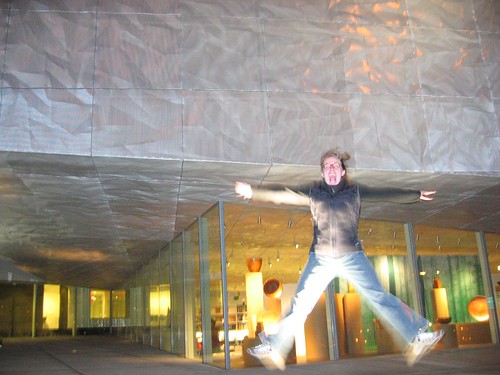Last weekend, I had an unlikely opportunity: I was invited to sit on a panel that discussed the future of small literary presses, non-profit publishing, and — in general — books that took place at Coffee House Press in Minneapolis. I love books, reading, and non-corporate media, so I jumped at the chance to talk about this stuff in public. You may ask: Why me? I have a person on the inside who knows that I like to talk.1 My fellow panelists were a murderer's row of publishing insight. Rick Simonson is the co-founder of Copper Canyon Press and a book buyer at the Elliott Bay Book Company in Seattle; Richard Nash is the publisher of Soft Skull Press; Patricia Wakida runs Wasabi Press; and, Michael Coffey is the Managing Editor at Publisher's Weekly (and the author of an excellent baseball book, 27 Men Out).When we got started, I suspected I'd been tossed in a shark tank wearing a meat necklace. I found myself rattling on about things in my frame of reference — technology, social media, iPhones, Kindles, stuff wanting to be free — and I worried that all of it was simply chumming the waters for my fellow panelists who (a) know a lot about publishing, and (b) clearly recognized that their business models are being eroded by technologies that offer new ways to read (i.e., everything with a screen) and supply chain disintermediation, i.e. Amazon.
Side note: The weather was beautiful
 Whenever I take a picture of him, Fish (i.e., Chris Fischbach of Coffee House) tells me: "I better not see this on the Internet." But I just had to take this one while he and Katie (of Graywolf and New York Times fame) took me on an excellent walk along the Mississippi just before winter arrived.
Whenever I take a picture of him, Fish (i.e., Chris Fischbach of Coffee House) tells me: "I better not see this on the Internet." But I just had to take this one while he and Katie (of Graywolf and New York Times fame) took me on an excellent walk along the Mississippi just before winter arrived.As it turned out, we had a series of productive conversations. My colleagues and the audience were keen to know about how companies go about determining the right way to conceive technological products, and to implement them appropriately. Meanwhile, I learned a lot about small presses, publishing, and the ways that editors at literary presses think about their work. Allan Kornblum, the founder of Coffee House Press, saw himself as "the inheritor of the Maxwell Perkins tradition" in creating deep and lasting relationships with artists, supporting them and providing a consistent venue for publication. Fish said that he wanted "to create art objects that last." Both of those goals make a lot of sense to me, and they seem like a firm foundation for a business in transition.
So, what is the future of reading, anyway?
I'm going to put together another post about my thoughts on this topic, and in the meantime I'm going to be digesting some of the work that my fellow panelists referenced during our discussions; this list includes Ursula Le Guin's "Notes on the alleged decline of reading" that I saw in Patricia's pile of notes; Michael mentioned Bill McKibben's new book, Deep Economy in making a comparison between regional literature and a larger movement toward regional and local economies; Richard spoke a couple of times about literary subscription programs, such as Soft Skull's annual edition, and Powell's indiespensable list. 1 I was there because my friend Fish (the senior editor at Coffee House Press) thought that my experience with technology and online product strategy would complement the deep expertise of the small press luminaries on the panel. Or perhaps he just wanted to see what happened when I said the words "Kindle" and "free" around Michael Coffey. In the end, there would be no way of knowing.
